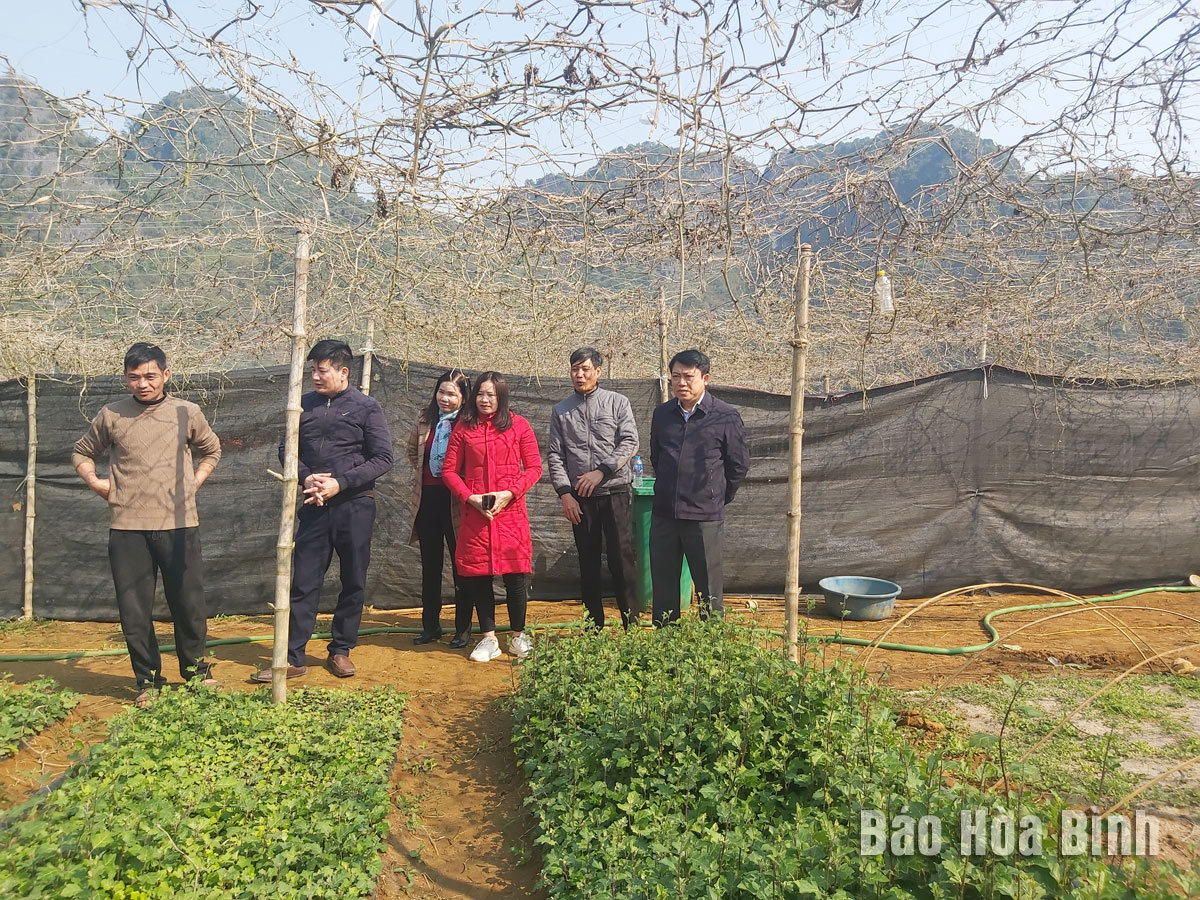
Yen Thuy district is actively implementing a comprehensive range of measures to develop its One Commune One Product (OCOP) product offerings. Currently, the district boasts four 4-star and 17 3-star products under the programme. A standout among them is the 4-star ca gai leo (Solanum trilobatum Linn) glue product, which has steadily expanded its presence in both local and regional markets.
Leaders of the Yen Thuy People's Committee visit the nursery of the Bao Hieu Ca Gai Leo Agro-Forestry Cooperative.
According to Bui Quy Hoi, Director of the Bao Hieu Ca Gai Leo Agro-Forestry Cooperative, in early 2015, as part of a poverty reduction programme, ca gai leo, a medicinal plant used in the treatment of various type of diseases, was introduced to Da Phuc commune. Suitable to local soils, the crop thrived, and residents quickly expanded cultivation areas. However, hasty expansion without a specific plan led to unstable outlets and price pressures, with costs sometimes dropping to below 10,000 VND per kg. Therefore, local farmers began uprooting the crop.
"At the end of 2015, I decided to mobilise households in the commune to establish a cooperative specialising in growing the herbal plant. In January 2016, the Bao Hieu Agro-Forestry Cooperative was established,” Hoi said. Pressing issues facing the crop were gradually addressed. From nine members at first, the cooperative has expanded its membership to 100, with the members now involved in a linked cultivation model across more than 40ha in Bao Hieu and Da Phuc communes.
The cooperative researched and produced its glue product, which boasts a longer shelf life. The herb has various uses, such as detoxifying the liver, lowering liver enzymes, relieving alcohol effects, assisting in treating liver inflammation Type B, fatty liver and fatty blood diseases, back pain, fatigue, and sore throat.
At the provincial OCOP product evaluation conference in 2019, the product claimed a 3-star rating. In 2021, it was accredited with meeting the 4-star standard.
Hoi noted that the product has been trademarked and is available in foreign markets like China, Russia, and Thailand, receiving high praise. The annual profit from it hit between 1.5 and 2.5 billion VND (61,589 – 102,648 USD). The average monthly income is 11.5 million VND per member.
In addition to the efforts of its members, the cooperative has received support from the Yen Thuy authorities, helping its product firmly establish a position in the market.
According to data from the Hoa Binh Provincial Party Committee, the industrial production index for the first six months of 2025 is estimated to have increased by 20% compared to the same period last year. This marks the highest year-on-year growth rate for this period since 2020.
In the first six months of 2025, Hoa Binh province’s export turnover was estimated at 1.145 billion USD, marking an 18.11% increase compared to the same period in 2024. Import turnover was estimated at $ 804 million, a 17.15% increase, which helped the province maintain a positive trade balance.
The lives of the ethnic minority farmers in Tan Lac district have gradually improved thanks to the new directions in agricultural production. This is a testament to the collective strength fostered through the professional associations and groups implemented by various levels of the district’s Farmers’ Union.
With the motto the "product quality comes first,” after nearly one year of establishment and operation, Muong village’s Clean Food Agricultural and Commercial Cooperative, located in Cau Hamlet, Hung Son Commune (Kim Boi district), has launched reputable, high-quality agricultural products to the market that are well-received by consumers. The products such as Muong village’s pork sausage, salt-cured chicken, and salt-cured pork hocks have gradually carved out a place in the market and they are on the path to obtaining the OCOP certification.
In the past, the phrase "bumper harvest, rock-bottom prices" was a familiar refrain for Vietnamese farmers engaged in fragmented, small-scale agriculture. But today, a new spirit is emerging across rural areas of Hoa Binh province - one of collaboration, organisation, and collective economic models that provide a stable foundation for production.
Maintaining growing area codes and packing facility codes in accordance with regulations is a mandatory requirement for agricultural products to be eligible for export. Recently, the Department of Agriculture and Environment of Hoa Binh province has intensified technical supervision of designated farming areas and packing facilities to safeguard the "green passport" that enables its products to access international markets.



